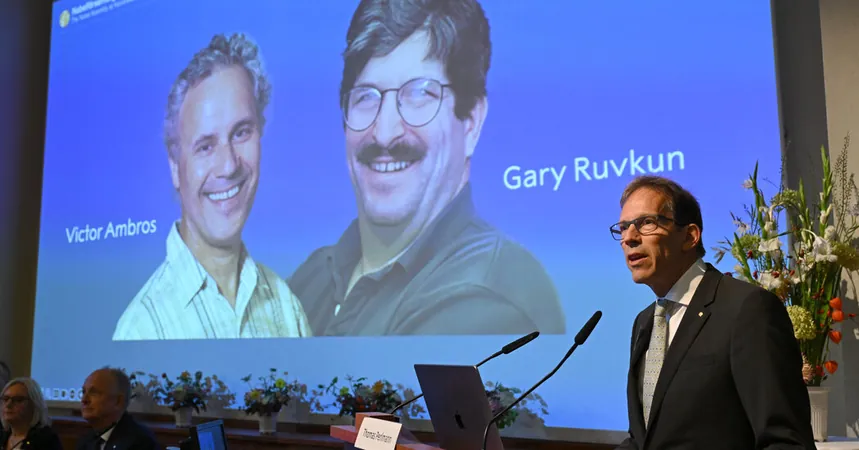
Victor Ambros and Gary Ruvkun: The Nobel Prize Winners Revolutionizing Our Understanding of MicroRNA!
2024-10-07
Author: Kai
On Monday, renowned scientists Victor Ambros and Gary Ruvkun received the prestigious Nobel Prize in Physiology or Medicine for their groundbreaking discovery of microRNA. This class of tiny RNA molecules has unlocked new insights into the way organisms develop, function, and, intriguingly, how they sometimes fail to do so properly.
MicroRNA plays a pivotal role in gene regulation—a fundamental mechanism that differentiates cell types among multicellular organisms, including humans. The Nobel Committee has highlighted that disruptions in gene regulation can lead to severe health issues, including cancer, diabetes, and various autoimmune disorders. The unraveling of microRNA's functions has shown that the human genome harbors instructions for over 1,000 types of these critical molecules, underscoring their importance in cellular development and organ function.
Jon Lorsch, director of the National Institute of General Medical Sciences, commented on the profound implications of this discovery: “That opened up a whole new understanding of how diseases happen, which means that we have new possibilities for reversing them.” Remarkably, treatments inspired by this research are already in clinical trials targeting heart disease, cancer, and neurodegenerative conditions.
Who Are the Trailblazers Behind This Discovery?
Dr. Victor Ambros hails from Hanover, New Hampshire, serving as the Silverman Professor of Natural Science at the University of Massachusetts Medical School in Worcester. Meanwhile, Dr. Gary Ruvkun is from Berkeley, California, and holds a professorship in genetics at Harvard Medical School alongside his role at the Mass General Research Institute.
Their collaboration began during their postdoctoral studies at the Massachusetts Institute of Technology (MIT) under the mentorship of H. Robert Horvitz, a Nobel laureate in 2002. Their joint efforts led to their 2008 Albert Lasker Basic Medical Research Award, often seen as a precursor to the Nobel Prize, for their contributions to the understanding of tiny RNAs.
Why Is This Discovery Groundbreaking?
Often simplified in high school biology classes, RNA is viewed as a messenger carrying instructions from DNA to produce proteins. However, the work of Ambros and Ruvkun suggests a more intricate picture. Their research indicates that microRNA—far shorter than typical RNA—plays a crucial role by regulating the protein production process. This capability is vital, as an imbalance in protein levels can lead to diseases such as cancer and osteoporosis.
Their initial research on the roundworm *C. elegans*, a widely used model organism, revealed microRNA's significant influence. Interestingly, the journey of their discovery began with a moment of inspiration when Dr. Ruvkun, while consulting graduate students, first identified the novel microRNA molecule. His findings, initially met with skepticism, have since transformed our understanding of molecular biology.
As our comprehension of microRNA continues to deepen, researchers are exploring new therapeutic avenues that could lead to breakthroughs in treating major diseases. From congenital hearing loss to skeletal disorders, the implications of this discovery span a wide array of health conditions.
This Nobel Prize not only honors Ambros and Ruvkun's dedication and innovation in science but also marks a transformative moment in medical research, setting the stage for future advancements that could change the landscape of healthcare globally. Stay tuned—this is just the beginning of what could be an extraordinary chapter in our understanding of genetics and disease!




 Brasil (PT)
Brasil (PT)
 Canada (EN)
Canada (EN)
 Chile (ES)
Chile (ES)
 España (ES)
España (ES)
 France (FR)
France (FR)
 Hong Kong (EN)
Hong Kong (EN)
 Italia (IT)
Italia (IT)
 日本 (JA)
日本 (JA)
 Magyarország (HU)
Magyarország (HU)
 Norge (NO)
Norge (NO)
 Polska (PL)
Polska (PL)
 Schweiz (DE)
Schweiz (DE)
 Singapore (EN)
Singapore (EN)
 Sverige (SV)
Sverige (SV)
 Suomi (FI)
Suomi (FI)
 Türkiye (TR)
Türkiye (TR)